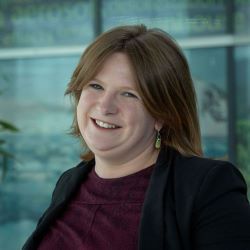Dr Freya Garry
Freya is a Senior Scientist working to improve the inclusion of state-of-the-art climate science into useful and useable climate service prototypes.
 Areas of expertise
Areas of expertise
- Climate science
- Communicating climate science
- Multiple hazards
- Risk projections
- Atlantic and European climate change
- Data Science
- The ocean’s role in the climate system
- Understanding uncertainties in models and observations
- Deep ocean temperature change
Email: [email protected]
Current activities
As a member of the UK Climate Resilience team in the UK Applied Science area of the Met Office, Freya studies projections of future UK and European climate change to understand how climate change will affect UK and European sectors such as agriculture and the finance sector. Understanding future risk from climate change and increased extreme weather helps society make decisions about how to stay safe and thrive.
From early 2023, Freya has been developing case studies of seamless/seasonal to decadal climate services under the Horizon Europe ASPECT project (Adaptation-oriented Seamless Predictions of European ClimaTe).
Freya’s work between 2019-2022 contributed to a UK wide project on Climate Resilience, the UK Strategic Priority Fund for Climate Resilience, and was focussed on developing compound event science for UK climate services, with a focus on the agricultural sector.
Freya is passionate about promoting diversity and inclusion across science and is involved with diversity initiatives in Exeter. Freya co-founded the Women in Climate network in 2018 at the University of Exeter which now exists as a joint network with the Met Office. Freya is also involved in the PRISM Exeter network which showcases LGBT+ science from Exeter and beyond.
Freya is a keen climate science communicator and represents the Met Office across various mediums, from national print media and radio to blogs, podcasts and Twitter Spaces discussions.
Freya participated in the Climate Stories project, using various art forms to communicate climate science and led Met Office involvement in the Hot Poets project which featured at COP26. Freya is a STEM Ambassador at the Met Office, participating in outreach activities to encourage students to study STEM subjects.
Career background
Freya started studying climate science whilst doing an integrated Master of Oceanography degree at the University of Southampton, completing the course with first class honours, and graduating with the top grade of the year in 2013. Freya received an IMarEST undergraduate scholarship and the Southern Joint Branch of RINA and IMarEST prize for excellence on IMarEST accredited courses in 2013. Freya started working with the Met Office during their degree by undertaking a summer internship in 2012 on Atlantic oceanography, which subsequently led to their first peer reviewed publication.
In 2013, Freya commenced a PhD at the University of Southampton, partly funded by the Met Office, to understand deep ocean temperature trends. Freya’s PhD research formed a significant part of one of the 2018 Met Office synthesis reports for the AtlantOs Horizon 2020 project. In 2017, Freya graduated from the University of Southampton and moved to the University of Exeter to work as a postdoc on the ‘Climate of the Last Millennium’ project in partnership with the Met Office, which also involved studying the oceans and climate change over the centuries. In 2019, Freya started working at the Met Office.
Freya is an experienced communicator and has lectured for summer schools on paleoclimate and ocean science at the University of Cardiff (2018) and University of Exeter (2018 and 2019). Freya co-coordinated the NERC Advanced Training Course ‘Oceans in Weather and Climate’ held at the Met Office in 2016 and taught the practical sessions again when the course was re-run at the Met Office in 2018. Freya represented Geography at the University of Exeter talking to school children for Britain Needs Scientists 2018 and was a Brilliant Club Tutor during 2018, teaching climate science in a programme that aims to increase the number of pupils from underrepresented backgrounds progressing to highly selective universities.


